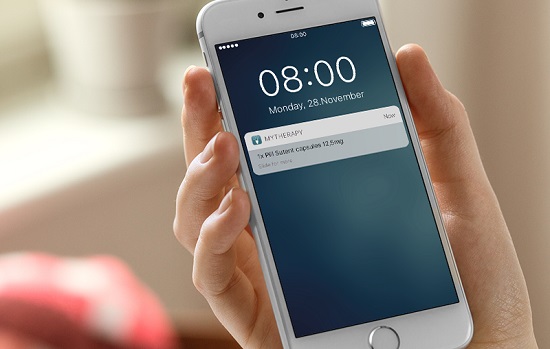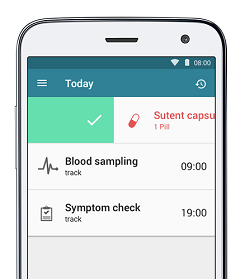Have You Been Diagnosed with Kidney Cancer? Need Some Help Managing Treatment? Find out More Here
A Kidney Cancer Diagnosis Can Be Overwhelming, so You Need All the Support You Can Get. Use MyTherapy to Help You Manage the Treatment Process

Kidney cancer, also known as renal cancer, is a disease in which kidney cells become cancerous, grow out of control, and form a tumor. In 2015, there were more than 12,000 new reported cases of kidney cancer in the UK. There are several different types of kidney cancer, the most common one being renal cell carcinoma (RCC). Most kidney cancers are found before they spread to other organs, but because kidney cancer rarely shows any obvious symptoms, it can go undetected. The good news is that kidney cancer is treatable, especially if it is detected in its early stages. Treatment options include surgical removal of the cancerous cells/ tumor, radiotherapy, immunotherapy, and targeted treatments. Of course, if you have been diagnosed with kidney cancer, you will most likely feel overwhelmed with the treatment process and may feel ill-equipped to manage the condition. Therefore, it is important that you have a structure and routine in place to help you cope with your treatment plan, medication, and doctors' appointments. Medication reminder and health tracker apps, like MyTherapy, can help you in this regard.
MyTherapy is an easy-to-use yet comprehensive app designed for people fighting long-term illness like kidney cancer. Firstly, it generates specific medication reminders, which remind you when and how to take your medication. The reminders can also be used for doctors' or specialist appointments. The alarm reminders are tailored to your schedule and can be changed on weekends. This helps you consistently stay on top of your treatment and adhere to a strict medication-intake schedule. Aside from the alarm (which can be set to silent or vibrate), you will also be reminded via a pop-up notification.
Secondly, the app comes with a built-in health diary, which you can use to track your symptoms and medication side-effects, monitor the progress of your treatment, set daily health goals, and record important measurements (like weight, blood pressure etc.). You can also make use of the lab values feature to record lab results. At the end of the month, you have the option to receive a monthly health report based on your logged data. This report is compiled into easy-to-read graphs, which you can share with your doctor/ specialist. You can therefore work closely with your doctor to ensure than you are progressing well with treatment. Furthermore, if you need some extra encouragement with your medication adherence, you can invite your friends and family on the app.
Lastly, the team at MyTherapy works hard to improve the app. We take our user feedback seriously and strive to make the app as tailored to your needs as possible. The app is also clinically proven to increase adherence rates. Dealing with a long-term condition is overwhelming enough and you need as much support as possible. Let MyTherapy help you monitor your condition and stay on top of treatment.
Renal Cell Carcinoma Is the Most Common Type
The kidneys are bean-shaped organs that lie in your lower abdomen on each side of your spine. Their main function is to clean your blood by removing waste products and producing urine. In kidney cancer, the cells of the kidney start growing abnormally and multiply uncontrollably. Eventually, the cancer may spread to other parts of the body if it is not detected early enough.
There are various forms of kidney cancer. Renal cell carcinoma (RCC) is the most common in adults, accounting for about 80% of kidney cancers. It affects the cells that line the tubules of the kidney. Renal cell carcinoma mainly affects people between the ages of 50 and 70 and it is more common among men than women.
Rarer types of kidney cancer include transitional cell cancer (also known as urothelial cancer) and Wilms’ tumor. Transitional cell cancers arise from the cells that line the bladder or the tubes that carry urine from the kidney to the bladder (called ureters). Wilms’ tumor is a type of kidney cancer that only develops in children.
Several Risk Factors
Cancers start from one abnormal cell that starts multiplying uncontrollably. It is not clear why exactly a cell becomes cancerous. The idea is that something damages or changes the genes of the cell. In many people, this appears to happen for no apparent reason. However, some risk factors have been identified that can increase the chances of developing RCC or another type of kidney cancer. For instance, about one third of kidney cancers are thought to be caused by smoking. Various workplace chemicals, such as asbestos, cadmium, and some organic solvents, have been linked to kidney cancer. Moreover, people who are overweight, have high blood pressure (hypertension), or have had long-term dialysis are at an increased risk of getting kidney cancer. Finally, genetic factors may play a role. Various faulty genes may trigger kidney cancer and can be passed on from parents to children.
There are steps you can take to improve your health and reduce your risk of kidney cancer. These include quitting smoking, maintaining a healthy weight, and controlling (https://www.mytherapyapp.com/how-apps-help-managing-hypertension-medication-blood-pressure-monitoring text:hypertension popup:yes).
Kidney Cancer Can Be Asymptomatic
In many cases, there are no symptoms at first - it is only when the tumor grows larger that symptoms may appear. The cancer is usually detected during tests for unrelated conditions or when the cancer progresses to a point where the symptoms become obvious. Signs of kidney cancer may include:
- Blood in your urine
- Unexplained weight loss
- Persistent pain on the side just below the ribs
- Loss of appetite
- A lump or swelling in the kidney area
- Fever that lasts for weeks
- Extreme fatigue
- Swelling in your ankles or legs
If you experience any of these symptoms, you should go and see a doctor immediately. He or she will ask you about your medical history and perform a physical examination. For an accurate diagnosis of RCC or any other form of kidney cancer, various tests are necessary. These may include urine tests, blood tests, or imaging tests (such as ultra sounds, MRIs, and CT scans). Sometimes the doctor may perform a nephrectomy, which is when he or she removes a part of the kidney to test it for cancer. You can also undergo an intravenous pyelogram, which involves X-raying your kidneys after the doctor injects a special dye that travels to your urinary tract. This will highlight any tumors.
Early Detection and Treatment
The earlier kidney cancer is diagnosed, the easier it is to treat. The type of treatment depends on the size and the spread of the cancer, as well as the age and the general health of the patient.
In around one third of cases, the kidney cancer is diagnosed at an early stage. This makes is possible to completely cure the condition by surgically removing the cancerous cells. If the cancer has spread to other parts of the body, it is possible to slow the growth of the cancerous cells and gain valuable years by a combination of surgical and non-surgical treatments. Non-surgical treatments often include:
- Radiotherapy: this treatment uses high-energy radiation to kill the cancerous cells and stop them from multiplying.
- Arterial embolization: in this treatment, the blood supply to the tumor in the kidney is blocked. This is done by inserting a long, thin, flexible tube (called a catheter) into a blood vessel in the groin. A substance will then be injected through the catheter to cut off the blood supply to the kidney.
- Immunotherapy: the aim of this treatment is to activate the immune system to attack the cancerous cells. This is commonly done with two types of medicines: interferon and aldesleukin (sometimes referred to as interleukin 2). Other immune therapies are currently being investigated, such as the possibility of using monoclonal antibodies to attack the cancerous cells.
- Targeted therapies: these treatments take advantage of the weaknesses of the cancer cells. For instance, a type of drug called multikinase inhibitors interfere with the growth of cancer cells. Multikinase inhibitors include sunitinib, pazopanib, and axitinib.
Control Kidney Cancer with MyTherapy
A diagnosis of cancer is always scary and the treatment process can be overwhelming and challenging. However, support is available and something as simple as an app can help you manage your treatment effectively. With its medication reminders and digital health diary, MyTherapy can give you the additional support you need to monitor your condition, work closely with your doctor, and stay on top of your treatment. The app is easy to use for patients of every age and you'll have everything you need to monitor and manage your condition in the palm of your hands. Start MyTherapy today and alleviate some of the worries associated with the treatment process.


